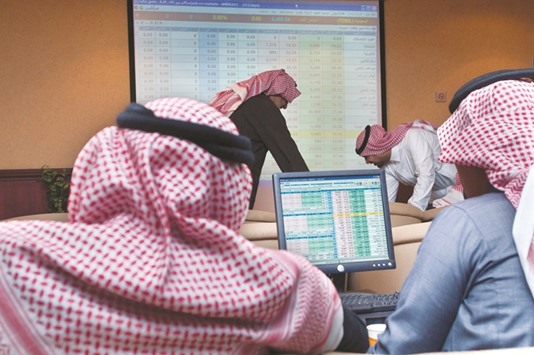Saudi Arabia’s stock index slumped 3.8% yesterday after the government said it would cut ministers’ salaries by 20% and scale back financial bonuses and perks for public sector workers under an austerity drive.
The new steps largely appear to formalise spending reductions introduced on an ad hoc basis since last year, and they will not by themselves make a huge difference to the government’s deficit.
NCB Capital estimated allowances accounted for about a quarter of the government’s total salary expenses last year, which were 38% of its overall budget.
Nevertheless, the announcement underlined the bleak outlook for Saudi government spending, which is a key driver of consumption, as oil prices stay low.
None of the 170 traded Saudi shares rose yesterday with roughly 30% of them dropping their 10% daily limits as trading volume jumped above the three-month average.
The index posted its biggest daily percentage drop since January.
The retail and insurance sectors were hard hit.
Luxury goods retailer Fitaihi slumped 10.0% and supermarket operator Al Othaim Markets dropped 4.7%.
The insurance sub-index retreated 5.9%; the sector is chiefly traded by local retail investors.
“Disposable income has been hit — traders can no longer afford to participate in the stock market because they now have to divert this money towards paying bills,” said a Jeddah-based broker.
“Moving forward I think there will be far more prudence when it comes to trading the speculative stocks.
For the value traders, this may be a good time to hunt for value.”
Banking shares, which had rallied on Monday, erased some of those gains with National Commercial Bank, a lender with close ties to the public sector, down 3.5% and Aljazira Bank, which does considerable business with stock market participants, shedding 5.4%.
Dubai’s main index pulled back 0.8% with 24 stocks declining and eight advancing.
Builder Drake & Scull, which has substantial exposure to Saudi business, dropped 1.8% and Dubai Parks and Resorts retreated 1.3%. Blue chips weighed on Abu Dhabi’s index, which fell 0.5%.
Dana Gas lost 3.6 % and First Gulf Bank declined 1.3%.
In Kuwait, banking shares rose after the central bank governor said the banking system was stable, with non-performing loans dropping to 2.4% of total loans in 2015 from 2.9% in 2014.
Al Ahli Bank rose 1.6% and Boubyan Bank added 1.3%. The main index edged up 0.1%. Meanwhile Cairo’s main index fell 0.3% in thin trade with losers outnumbering gainers 22 to three.
Qalaa Holdings, a private equity company, declined 3.3%.
Elsewhere in the Gulf, Egypt index edged down 0.3% to 7,949 points; Bahrain index slipped 0.02% to 1,139 points; Kuwait index added 0.1% to 5,412 points and Oman index dipped 0.3% to 5,749 points at the close yesterday.

Saudi Arabia’s stock index slumped 3.8% yesterday after the government said it would cut ministers’ salaries by 20% and scale back financial bonuses and perks for public sector workers under an austerity drive.
